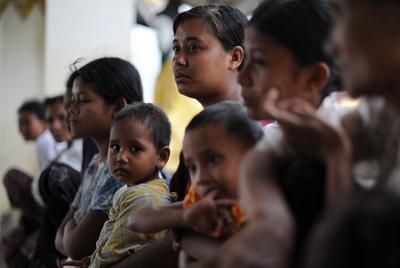The Thein Sein government quickly brought the situation under control, but the rights groups are demanding that Suu Kyi address the issue and work for a sustainable solution. But it will not be easy for Suu Kyi to bring about a significant change, as she will have to deal with the unfavourable majority view on Rohingyas.
Though ethnic conflict is not a new phenomenon to Myanmar, the recent riot in the Rakhine state and the outflow of Rohingya refugees to neighbouring Bangladesh brought Myanmar’s minority issues under closer international scrutiny.
The Rohingya issue is politically sensitive in Myanmar’s society and is of immense significance for Suu Kyi’s political career. This may be why her reaction to the Rohingya issue was cautious, which dismayed many human rights activists. Suu Kyi’s subsequent responses to this issue will be more important as it will show the people of Myanmar, its neighbours, international development partners and investors how she will deal with the minorities from her own position.
Myanmar is currently going through a transition to democracy, with the reformist government signalling a change in the pattern of governance — one can term it as a soft democracy. In the April by-elections Suu Kyi’s party, the National League for Democracy, won 43 of the 44 seats it contested. Though Suu Kyi will not have a handle on the national administration until the 2015 elections, she needs a clear and viable strategy to address expectations of economic progress and development before feelings of resentment start piling up.
The Rohingyas in the Rakhine state and in the refugee camps in Bangladesh want Suu Kyi to take a firm and clear stance to resolve the issue. But the social and political realities in Myanmar are rather complex, and Suu Kyi currently has limited political options.
The dominant Bamar ethnic group have a highly negative attitude toward the Rohingyas in Myanmar, which is reflected in the racist undertone in Myanmar’s Burmese language blogs and commentaries. Burmans and other minorities still consider Rohingyas as ‘outsiders’. The state has been unable to integrate them in the society and give them an opportunity to develop, and has often failed to protect the Rohingyas from ethnic persecution.
There are several factors that influence Suu Kyi’s stance on the Rohingya issue. First, her constituency, Kawhmu, is known to have an extremely anti-Rohingya stance. So it will not be easy for her to do something that will cause resentment in her own constituency. Second, there is a very negative perception about the Rohingyas even among some key members of her own party. And third, it is currently very difficult for Suu Kyi to take a position that might upset the majority of the population or go against populist mainstream opinion.
While talking to the press, Suu Kyi said that the lack of communal harmony in Myanmar is rooted in cultural and religious differences, which will take time to sort out. But immediate problems could be minimised with rule of law and legal safeguards to protect minorities. Suu Kyi visited the Myanmar’s Karen refugee camps during her visit to Thailand in May, which positively impacted the minorities and created new optimism. The Rohingyas also desire Suu Kyi to address them. But at this moment, it seems to be a bridge too far.
With an unprecedented level of popularity both at home and abroad, Suu Kyi faces high expectations from every segment of Myanmar society, especially from minorities like the Rohingyas. This is undoubtedly the crucial time for Suu Kyi to work toward building an inclusive society based on tolerance and pluralism. But one must not forget that Suu Kyi needs time.
The next few months will be crucial not only for Myanmar’s historic transition but also for Suu Kyi’s image and political future. Although Suu Kyi alone cannot solve Myanmar’s complex ethnic problems that have existed for decades, she can work for better and inclusive legal safeguards to protect the minorities. Nevertheless, there is optimism in Myanmar and Suu Kyi’s immense popularity might be instrumental in bringing about public opinion in favour of ethnic harmony and coexistence.
As a member of parliament, Suu Kyi is now part of Myanmar’s state establishment, which nearly two dozen armed ethnic insurgencies of various scales and intensities challenge. Her ultimate challenge will be to work toward restructuring Myanmar, keeping it unified while addressing the demands of the minorities that make up a third of the population.
Iftekharul Bashar is an Associate Research Fellow at the International Centre for Political Violence and Terrorism Research at the S. Rajaratnam School of International Studies, Nanyang Technological University, Singapore.
A version of this article first appeared here as RSIS Commentary No. 121/2012.

